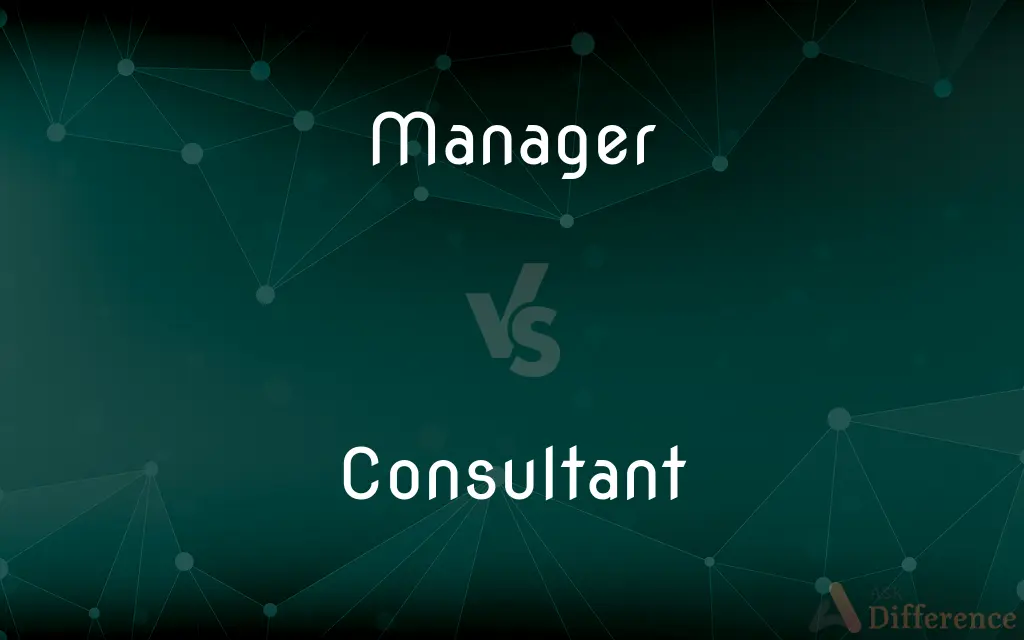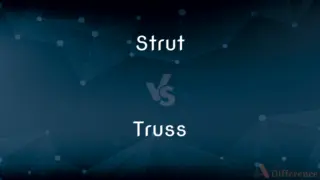Manager vs. Consultant — What's the Difference?
Edited by Tayyaba Rehman — By Maham Liaqat — Updated on April 17, 2024
A manager oversees and coordinates operations within an organization, focusing on execution and team guidance, whereas a consultant provides external expertise, advising on specialized matters to improve business outcomes.

Difference Between Manager and Consultant
Table of Contents
ADVERTISEMENT
Key Differences
A manager is typically an employee within an organization who is responsible for overseeing the work of a team or department, ensuring that tasks are completed efficiently and goals are met. On the other hand, a consultant is often an external professional hired to provide expert advice in a specific field, helping organizations solve issues, create value, or improve business performance.
Managers are integral to the daily operations of a company, involved in planning, decision-making, and managing resources. Whereas consultants are usually involved temporarily, focusing on particular problems or projects and are not involved in day-to-day operations.
The role of a manager is ongoing and focuses on maintaining and improving existing operations. In contrast, consultants often have a project-based role that is finite, focusing on specific outcomes and changes.
Managers often have a direct impact on their team’s career development through mentoring and performance reviews. On the other hand, consultants interact with staff in a way that is less personal and more focused on achieving the task at hand.
A manager’s success is measured by the productivity and effectiveness of their team or department. Whereas a consultant’s effectiveness is assessed based on the success of their advice and the tangible improvements it leads to in the client’s business.
ADVERTISEMENT
Comparison Chart
Role
Internal oversight of operations
External advisor on specific issues
Employment
Typically a permanent employee
Often hired on a project basis
Focus
Daily operations and long-term planning
Solving specific problems or improvements
Impact on Staff
Direct, with a focus on development
Indirect, task-focused
Success Measurement
Team productivity and efficiency
Achievement of advised outcomes
Compare with Definitions
Manager
An individual responsible for controlling or administering an organization or group of staff.
The manager implemented a new strategy to increase productivity.
Consultant
A professional who provides expert advice in a particular area.
The consultant advised us on how to improve our cybersecurity measures.
Manager
Someone who makes decisions about the use of resources, including personnel, finances, and equipment.
As a manager, she had to decide whether to hire more staff or invest in software.
Consultant
Typically works across various organizations rather than being employed by one.
As a consultant, he has worked with both startups and multinational corporations.
Manager
Often has a direct reporting relationship with employees.
The project manager met weekly with the team to assess progress.
Consultant
Engages with clients to assess and solve specific problems.
The management consultant was brought in to streamline the company’s workflow.
Manager
Focuses on operational effectiveness within their scope of authority.
The manager of the marketing department launched a new ad campaign.
Consultant
Often works on a contract basis, leading to varying work environments.
The consultant travels frequently, visiting different client sites each month.
Manager
A person at a middle or upper level of management who supervises people and/or resources.
The store manager regularly evaluates the performance of each department.
Consultant
Delivers specialized expertise that an organization may lack.
The environmental consultant provided guidelines that helped the company reduce waste.
Manager
One who directs a business or other enterprise.
Consultant
A consultant (from Latin: consultare "to deliberate") is a professional (also known as Expert, Specialist, see variations of meaning below) who provides advice and further purposeful activities in an area of specialization.
Manager
One who controls resources and expenditures, as of a household.
Consultant
One who gives expert or professional advice.
Manager
One who is in charge of the business affairs of an entertainer.
Consultant
One who consults another.
Manager
One who is in charge of the training and performance of an athlete or team.
Consultant
A person or party that is consulted.
Manager
A student who is in charge of the equipment and records of a school or college team.
Consultant
A person whose occupation is to be consulted for their expertise, advice, service or help in an area or specialty; a party whose business is to be similarly consulted.
Manager
(management) A person whose job is to manage something, such as a business, a restaurant, or a sports team.
Consultant
A senior hospital-based physician or surgeon who has completed all specialist training and has been placed on the specialist register in their chosen speciality, roughly equivalent to an attending physician in North America.
Manager
The head coach.
Consultant
An expert who gives advice.
Manager
(music) An administrator, for a singer or group. en
Consultant
An expert who gives advice;
An adviser helped students select their courses
The United States sent military advisors to Guatemala
Manager
(software) A window or application whose purpose is to give the user the control over some aspect of the system.
Manager
One who manages; a conductor or director; as, the manager of a theater.
A skillful manager of the rabble.
Manager
A person who conducts business or household affairs with economy and frugality; a good economist.
A prince of great aspiring thoughts; in the main, a manager of his treasure.
Manager
A contriver; an intriguer.
Manager
Someone who controls resources and expenditures
Manager
(sports) someone in charge of training an athlete or a team
Common Curiosities
What is the primary role of a manager?
The primary role of a manager is to oversee and ensure the smooth operation and administration of a part of an organization.
How do managers and consultants measure their success?
Managers measure success through the performance and productivity of their teams, whereas consultants measure success based on the effectiveness and implementation of their advice.
Do consultants have decision-making power in an organization?
Consultants typically do not have direct decision-making power; they advise and provide recommendations, while decisions are usually made by the organization’s management.
How does a manager interact with employees compared to a consultant?
A manager has a direct and ongoing relationship with employees, focusing on development and daily performance, whereas a consultant interacts with employees temporarily, focusing primarily on specific projects or challenges.
How does a consultant differ from a manager in terms of employment?
A consultant is typically hired on a project or temporary basis to provide specialized knowledge, unlike managers who are usually permanent employees.
Can a consultant be involved in the implementation of their recommendations?
Yes, some consultants may be involved in the implementation phase, particularly in specialized fields like IT or organizational change, to ensure that their recommendations are effectively applied.
What are the typical outcomes expected from a consultant’s work?
Typical outcomes include improved business efficiency, solved specific problems, implemented new systems, or enhanced competitive advantage.
Can a manager also be a consultant?
Yes, a manager can also act as a consultant, especially in scenarios where they provide expert advice within or outside their organization.
What types of problems does a consultant typically address?
Consultants address a wide range of issues from organizational structure and efficiency to specific technical problems within their area of expertise.
What skills are essential for a manager?
Essential skills for a manager include leadership, communication, problem-solving, and team management.
What skills are essential for a consultant?
A consultant needs strong analytical skills, expertise in their specific field, communication skills, and problem-solving abilities.
In what scenarios might a business prefer to hire a consultant instead of using internal managers?
Businesses might hire consultants for their specialized knowledge, objective advice, or to address issues that require expertise not available internally.
Is there a difference in accountability between a manager and a consultant?
Yes, managers are accountable for the ongoing performance and development of their team or department, while consultants are accountable for the quality and effectiveness of their advice and sometimes the implementation of their recommendations.
How do the goals of a manager and a consultant differ?
The goals of a manager are typically aligned with the long-term objectives of the organization, including growth, stability, and team development. In contrast, a consultant’s goals are project-specific and focused on addressing particular challenges or creating specific changes.
What is the impact of a consultant’s work on the long-term strategies of a company?
A consultant’s work can have significant impacts on a company’s long-term strategies by providing insights, introducing innovations, and recommending shifts that align with future goals and market trends.
Share Your Discovery

Previous Comparison
Moment vs. Momentum
Next Comparison
Strut vs. TrussAuthor Spotlight
Written by
Maham LiaqatEdited by
Tayyaba RehmanTayyaba Rehman is a distinguished writer, currently serving as a primary contributor to askdifference.com. As a researcher in semantics and etymology, Tayyaba's passion for the complexity of languages and their distinctions has found a perfect home on the platform. Tayyaba delves into the intricacies of language, distinguishing between commonly confused words and phrases, thereby providing clarity for readers worldwide.















































